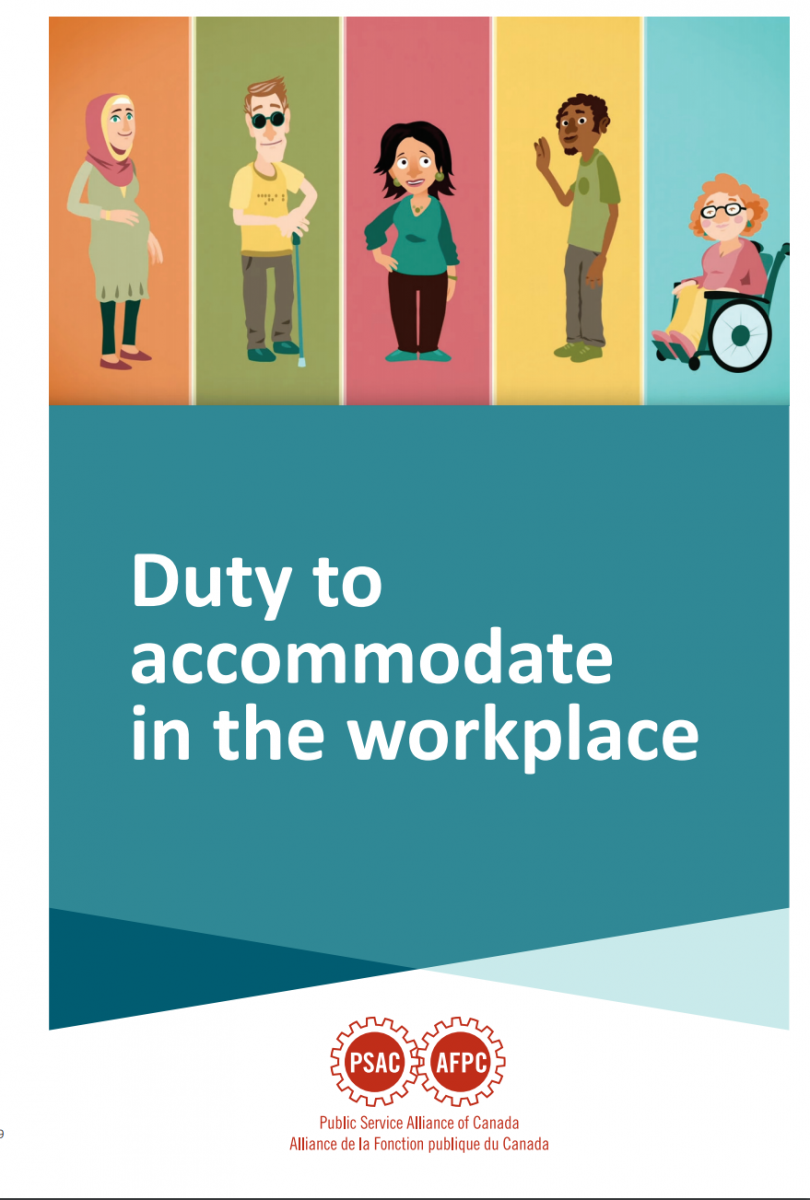
What is the duty to accommodate?
The duty to accommodate is the duty of employers to make sure that their workplaces are inclusive and allow all workers to participate fully. This duty relates to the grounds of discrimination in human rights laws.
What does this mean?
- The employer must design policies, procedures, requirements, standards and practices so that they do not create barriers to employees’ participation based on human rights grounds.
- The employer must adapt the workplace (physical work space, equipment, workplace rules, practices, etc.) to ensure that individual workers can fully participate.
Some examples of workplace accommodation:
- providing an adapted workstation if a worker has disability-related ergonomic needs
- allowing a gradual return to work for a specified period of time after an employee’s long-term absence
- providing a leave of absence or flexible work hours for a worker with family obligations or religious requirements.
Who has the right to accommodation at work?
The duty to accommodate is usually thought of in terms of disability, but it relates to a broad range of individual differences among workers. It applies to all “prohibited grounds of discrimination” under human rights laws are covered by the duty to accommodate. These grounds include disability, religion, family status, age, sex, gender identity, etc. These grounds vary under human rights laws federally and provincially/territorially, so refer to the laws covering your workplace for more information.
What are my rights as a worker who needs accommodation?
As a worker, you have the right to be able to attend work and participate in the workplace with equitable access to the opportunities and benefits that others receive, without discrimination.
Your rights include:
- the right to access the workplace without physical or other barriers
- the right to a harassment and discrimination-free workplace
- the right to respect and privacy when it comes to personal and medical information
- the right to reasonable accommodation based on any human rights ground
- the right to union representation.
What are my responsibilities?
A worker who needs accommodation also has responsibilities, including:
- to communicate accommodation needs to the employer
- to collaborate with the employer in the search for accommodation
- to provide medical information to demonstrate a disability-related accommodation need (but not including a diagnosis)
- to accept reasonable offers of accommodation (you cannot refuse and insist on the ideal or perfect accommodation).
What are the employer’s obligations?
The employer has the primary responsibility to accommodate a worker once that need has been identified.
The employer must:
- design workplace standards, policies, rules, etc. with accessibility and flexibility in mind so that they do not discriminate
- ensure the workplace is accessible and free from harassment and discrimination
- inform you of your rights
- ensure supervisors, managers, and workers are educated and aware of the duty to accommodate
- seek further information from you if they do not have enough information to provide accommodation
- respect privacy and confidentiality of your personal and medical information. The employer must get your consent before asking for information from your physician or obtaining other personal or medical information about you
- actively pursue options for accommodation and accommodate you to the point of “undue hardship” (a legal term meaning they can’t refuse because of minor cost or inconvenience)
How is the union involved?
The union has an important role to play and also has responsibilities as the worker representative.
Union representatives ideally should be involved in workplace accommodations, as they can help identify possible accommodations and seek recourse (e.g. a complaint, grievance, etc.) if your rights are not respected. A union representative can help you understand the accommodation process and assist you with filling in forms, communicating with management, etc.
Unions are also responsible for ensuring they assist workers and don’t block accommodations. They can also educate coworkers so that everyone in the workplace understands the importance of accommodation and human rights.
What can I do if I need help or resources?
- Talk to your local union representative or your component or PSAC regional representative.
- Learn more about the duty to accommodate:
- visit psacunion.ca/accommodate
- read Duty to Accommodate: A PSAC Guide for Local Representatives
- take part in workshops on the duty to accommodate through PSAC Education or the Joint Learning Program (if you’re in the federal public service)
- Visit the Canadian Human Rights Commission or your provincial/territorial human rights commission website for additional resources.
 Member Login
Member Login



